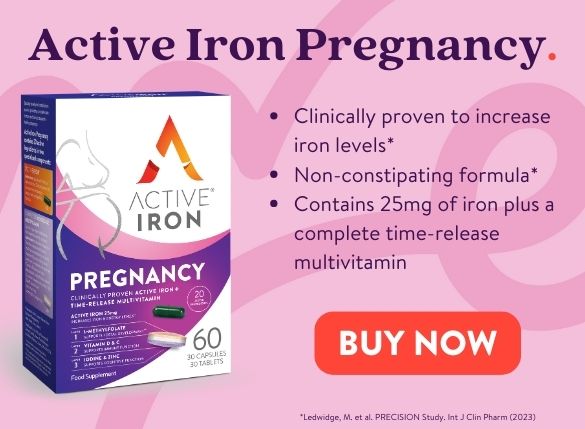Iron tablets during pregnancy
Iron is incredibly important and vital for life- this couldn’t be more true during pregnancy. Iron is responsible for healthy blood cell formation, particularly red blood cells, which carry oxygen to both mother and baby. It also has a role in many other important body processes.
We do not make iron within ourselves, so we must ingest it through our diet or through supplements. Taking an iron supplement or iron tablet means that you are ensuring your body as enough of this fundamental micronutrient to keep both you and baby healthy.
When to take iron tablets during pregnancy?
Iron is the most common micronutrient deficiency in the world. It is estimated that 2.1 billion people, mainly women and children, have an iron deficiency.
Women are particularly at risk due to menstruation and reproduction, requiring double the daily dose of iron that men need for normal body processes.
During pregnancy, because of the needs of the growing baby and that the amount of blood in the body doubles, the requirement for iron also increases. It is estimated that up to 40% of women may have inadequate iron levels or stores.
Many women are unaware that their iron levels may be inadequate and therefore I would recommend taking iron supplements if you are planning a pregnancy or as soon as you find out and continuing right until the baby is 3 months old.
In which trimester is iron most important?
Having good iron levels, including iron stores (ferritin) is important whether you are pregnant or not.
If you are planning to get pregnant, it’s a good idea to ask your GP of healthcare provider to check your iron levels and your ferritin.
Taking an iron supplement pre-conception right the way through to 3 months postnatally is a good idea. The most important trimesters are 2 and 3 as this is when your baby and your own needs are greatest.
In the 3rd trimester, you need to take in enough iron so that your baby will have enough iron stores to last them from birth to when they are weaned onto solids!
It’s also interesting to note that you will lose some blood even if you have a normal vaginal delivery, so ensuring that you have good iron levels post-delivery means you will recover faster and be less tired.

How much iron per day during pregnancy?
During pregnancy, you need an average of 27-30mg per day. If your iron levels are inadequate or at risk of being inadequate already, you might require as much as 60mg per day. Always talk to your GP, midwife, or other healthcare professional if you have any concerns.
Natural sources of iron during pregnancy
In food, iron comes in 2 forms: Heme and Non-heme. Heme iron is found in animal sources such as beef, lamb and pork and is the form that is easier for the body to absorb and use. Non-heme iron is found in leafy vegetables, pulses and legumes. Non-heme iron is more difficult to break down and absorb. For more information, please see our guide to the importance of iron supplementation.
Best iron supplement during pregnancy
Not all supplements are created equally. The traditional iron supplements of ferrous sulphate while low in cost, tend to not be absorbed well and have many side effects such as constipation and gastrointestinal comfort.
Active Iron is different as it is both Kind & Strong. It is an incredible Iron supplement for pregnancy and is clinically proven to increase iron stores by 94% while being non-constipating. As a midwife, I recommend Active Iron Pregnancy, which contains non-constipating Active Iron plus a complete time-release multivitamin providing all the key nutrients mum and baby need throughout pregnancy. Please visit iron supplements for women & iron supplements during pregnancy for more information.
Iron tablets in pregnancy, when to start – Research:
Janbek, J., Sarki, M., Specht, I.O. et al. A systematic literature review of the relation between iron status/anemia in pregnancy and offspring neurodevelopment. Eur J Clin Nutr 73, 1561–1578 (2019). https://doi.org/10.1038/s41430-019-0400-6
Michael K. Georgieff, (2020) Iron deficiency in pregnancy. American Journal of Obstetrics and Gynecology, 223: 4,516-524, ISSN 0002-9378. https://doi.org/10.1016/j.ajog.2020.03.006.
Pavord, S., Daru, J., Prasannan, N., Robinson, S., Stanworth, S., Girling, J. (2020), UK guidelines on the management of iron deficiency in pregnancy. Br J Haematol, 188: 819-830. https://doi.org/10.1111/bjh.16221
World Health Organization.(2016) WHO recommendations on antenatal care for a positive pregnancy experience. WHO Rep.;1–120. https://www.who.int/publications/i/item/9789241549912
Demuth, I.R., Martin, A. & Weissenborn, A.(2018) Iron supplementation during pregnancy – a cross-sectional study undertaken in four German states. BMC Pregnancy Childbirth 18, 491 https://doi.org/10.1186/s12884-018-2130-5




